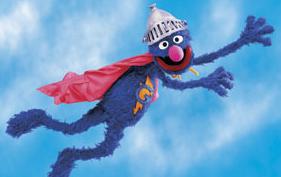Follow That Bird
I think we all had a sort of select group of films we watched as children over and over and over and over and over and over again. Mine were The Great Muppet Caper, Willy Wonka and the Chocolate Factory, Pee-Wee's Big Adventure and...as if you haven't guessed...Follow That Bird.
Maybe it's because, as a child, you are without finances of your own and so can't purchase a wide assortment of films for yourself. Maybe it's because you have limited mobility and can't make it to the theater very often to see new films. Or maybe it's the instinct young children seem to have to hold a few of their possessions much closer than their others. But, whatever the reason, we all had that core group of films. And I don't know if the fondness we had for them ever really fades.
So finding it in a bin of used DVDs for five dollars or so, how could I resist? One way or the other it was a film I wanted to own...but I did have to wonder: was this film actually any good?
Surely your expectations as a five year old are much different than your expectations as a twenty five year old. Would Follow That Bird still hold my attention? Would the part where he turns blue still make me cry?
First things first: it's always (repeat: always) a delight to watch Muppets do their thing. Jim Henson was, without question, a true genius. He not only shaped foam rubber and felt into amusing characters...he also gave them personalities--and made them very expressive. He was a visionary, and his characters helped to shape childhood for millions of kids.
 And maybe it's only because I grew up with the Muppets myself that I'm so drawn to them, but I really think that Henson, Frank Oz, Caroll Spinney and the rest were having such fun that it's impossible for an audience not to share in the joy. Absolutely anything these characters do is a delight...even something as simple Big Bird sitting in an airplane, or walking in a field alongside Snuffleupagus, is just so...delightful. Henson created not only such varied characters, but he created a world for them...a world in which they were beautiful, and in which happiness is highly contagious.
And maybe it's only because I grew up with the Muppets myself that I'm so drawn to them, but I really think that Henson, Frank Oz, Caroll Spinney and the rest were having such fun that it's impossible for an audience not to share in the joy. Absolutely anything these characters do is a delight...even something as simple Big Bird sitting in an airplane, or walking in a field alongside Snuffleupagus, is just so...delightful. Henson created not only such varied characters, but he created a world for them...a world in which they were beautiful, and in which happiness is highly contagious.
In this case, the world was Sesame Street...and in this film, a meddling social worker (Miss Finch, a new Muppet voiced by Sally Kellerman) takes Big Bird away from that world. She believes that Big Bird can only be truly happy with others of his own kind, and it's a view Big Bird comes to share after a little coersion.
Of course, Big Bird's new life--away from his friends--is not satisfying. Miss Finch arranges for him to be adopted by a family of dodos, all of whom mean well and treat him as a member of the family...but homesickness takes over, and Big Bird legs it, rationalizing that if it took two hours to fly from New York to Illinois, it should only take about three hours to walk back.
The bulk of the film deals with various members of the Sesame Street crew (both humans and Muppets) trying to intercept Big Bird on his way home to keep him out of trouble...and Big Bird getting into said trouble. As a child I remember enjoying the film very much, and now, as an adult, I enjoyed the film very much all over again. But something was missing...
What was missing was the element of danger. Somehow, as a kid, I remember Big Bird's trek home to be so long...and not in a bad way. I remember that it seemed to go on forever...it really felt like there was no chance Big Bird was ever going to make it. Not this time.
But watching it again the film seems almost too short...more like Big Bird being lost across town than lost halfway across the country. Couple this with the fact that Big Bird's main antagonists are a pair known as the Sleaze Brothers (Joe Flaherty and Dave Thomas) who make me hesitant to admit that I was ever afraid of.
But that's a very small complaint...especially when you consider that anything that would be scary to me at twenty-five would probably be downright horrifying to a toddler...so the low likelihood of Big Bird coming to any real harm is a good decision rather than a bad one.
So that was one thing the film lost for me as I grew up. It also, however, managed to gain something: a social conscience.
A child watching Follow That Bird would never pick up on what becomes much more obvious to an adult: the strong overtones of racism.
Big Bird being happier with members of his own kind is thrown around (by Miss Finch) as fact. There is no debate: birds go best with birds. It's a view held by Big Bird's new family, as well; Snuffleupagus is not allowed to visit because--wouldn't you know it--it isn't right for Big Bird to have non-bird friends.
And while the point is made at the end of the film that Sesame Street is made up of people and creatures of all kinds, one thing that's implied is that no two people are alike. It isn't the fact that blacks can get along with whites, or that Grover can get along with the Count, or anything like that...it's that every character is different...a different color, a different shape, a different personality with a different life and different goals. It isn't group vs. group, it's everybody existing as an individual, and nobody else feeling threatened by that.
A pretty great lesson for Follow That Bird to tackle, and they handle it well...the plot of the film may hinge on Big Bird's relocation, but it's driven by his adventures on his way home, and not by heavy-handed agenda.
 As far as Muppet movies go, this isn't the best one (Great Muppet Caper cough hack), but it's still pretty high in quality for a children's film. It has more than its share of genuine laughs (Big Bird's new home is on Canary Row, Oscar drives with a Honker in his back seat because his horn is broken) and it has appropriate emotion when necessary (is anything sadder than seeing Big Bird cry?).
As far as Muppet movies go, this isn't the best one (Great Muppet Caper cough hack), but it's still pretty high in quality for a children's film. It has more than its share of genuine laughs (Big Bird's new home is on Canary Row, Oscar drives with a Honker in his back seat because his horn is broken) and it has appropriate emotion when necessary (is anything sadder than seeing Big Bird cry?).
In all Muppet movies you can expect two things: celebrity cameos and musical interludes. In Follow That Bird neither of these disappoints.
The cameos include John Candy as a police officer, Chevy Chase as a Weekend Update-esque newsman, Sandra Bernhard as a Grouch waitress and Kermit the Frog as a reporter. (Alright, so Kermit was a reporter in Sesame Street, but it's still a cameo.) All of them do an excellent job, and they're all clearly happy to be involved in what must be--let's face it--one of the most enjoyable franchises to be cast in.
The musical numbers are great, as well--though, oddly, there is not a version of the Sesame Street theme. The film opens with The Grouch Anthem, as sung by Oscar and a few other Grouches, and then we're musically silent until well into Big Bird's journey when he meets up with truck driver Waylon Jennings and they perform Ain't No Road Too Long. It's a very, very catchy tune--and the montage of Big Bird's Sesame Street friends coming to find him really make it work as a rambling sort of plot piece.
Easy Goin' Day is the other "happy" song in the film, and it's probably one of the best written for a Muppet film. Big Bird sings it with some children who take him in while he helps with chores...and it's definitely a song for a sunny afternoon.
The two "sad" songs in the film are One Little Star, sung simulateously (but separately) by Big Bird, Maria and Snuffleupagus, each looking into the sky and missing the others, and I'm So Blue, which is sung by Big Bird when he's captured by the Sleaze Brothers and painted blue. Am I the only one who cries when Muppets sing sad tunes? I really hope not.
And then there's one really--really--bizarre number called Upside Down World. I can't even classify this. It's sung by Bert and Ernie in their major scene as they fly over a cornfield looking for Big Bird...Ernie flips the plane upside down and the two perform this demented carnival tune while pontificating about what life would be like if the entire world could turn upside down. It's remarkably complex for a Muppet tune, and certainly an oddball in their performance canon. It really serves to make the scene stand out, though, and, as it's Bert and Ernie's major scene in the film, this is not a bad thing.
The whole thing wraps up neatly in the end as you knew it would...and the film leaves the viewer alone with Count Von Count, who counts the production credits for you. (Has anyone checked his final tally? Is it correct?)
I would never say that the film has aged perfectly in the intervening years, but I will say that it retains all of Jim Henson's magic. If you can let yourself get past the fact that you're watching a cast of colored foam with ping-pong ball eyes (and it's much easier to get past than an outsider might imagine) you can enjoy the world inside the imagination of a genius.
About this entry
- By Phil Reed
- Posted on Thursday, August 17 2006 @ 10:31 pm
- Categorised in Film
- 2 comments

If you ever get a chance to see 'Jim Henson's Puppet Improv', do so. It's perhaps the most fun I've ever had in a theatre, and you get to be in the same building as Brian Henson. Anyway, this film sounds like it rocks, especially with Count Von Count tallying the credits.
By Tanya Jones
August 19, 2006 @ 10:38 pm
reply / #
I've never actually heard of that before, Tanya. Anyone else curious can go here:
http://muppet.wikia.com/wiki/Puppet_improv
I have to admit that while the details are scant, I can only imagine this must make for a really great night out. (Though, honestly, I'd probably be just as happy or happier with the children's version.)
And yeah, Count Von Count is one of the "core" characters chasing Big Bird, which was unexpected as he's such a one note character. (One! One note! ah-ah-ahh...)
But he was always one of my favorites, so it's nice. And Bert and Ernie singing in a biplane would make pretty much any movie worthwhile.
By Philip J Reed, VSc
August 20, 2006 @ 7:04 pm
reply / #